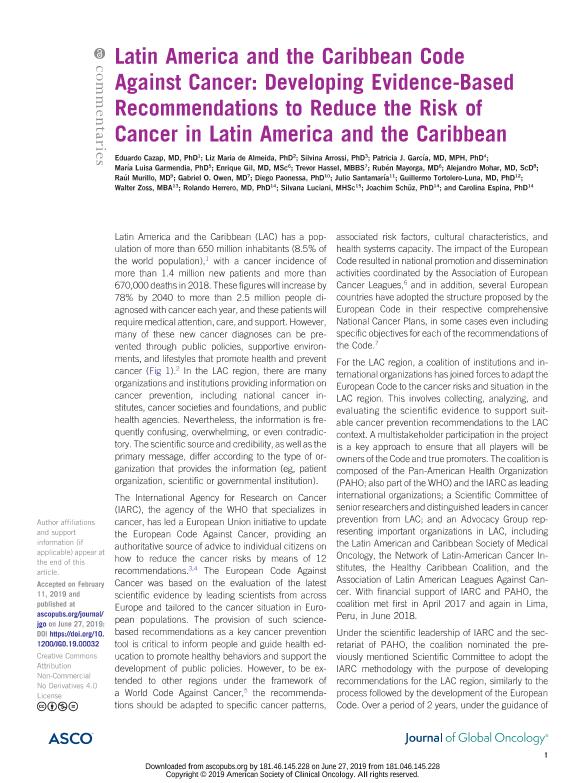Artículo
Latin America and the Caribbean code against cancer: Developing evidence-based recommendations to reduce the risk of cancer in Latin America and the Caribbean
Cazap, Eduardo; de Almeida, Liz Maria; Arrossi, Silvina ; García, Patricia J.; Garmendia, María Luisa; Gil, Enrique; Hassel, Trevor; Mayorga, Rubén; Mohar, Alejandro; Murillo, Raúl; Owen, Gabriel O.; Paonessa, Diego; Santamaría, Julio; Tortolero Luna, Guillermo; Zoss, Walter; Herrero, Rolando; Luciani, Silvana; Schüz, Joachim; Espina, Carolina
; García, Patricia J.; Garmendia, María Luisa; Gil, Enrique; Hassel, Trevor; Mayorga, Rubén; Mohar, Alejandro; Murillo, Raúl; Owen, Gabriel O.; Paonessa, Diego; Santamaría, Julio; Tortolero Luna, Guillermo; Zoss, Walter; Herrero, Rolando; Luciani, Silvana; Schüz, Joachim; Espina, Carolina
 ; García, Patricia J.; Garmendia, María Luisa; Gil, Enrique; Hassel, Trevor; Mayorga, Rubén; Mohar, Alejandro; Murillo, Raúl; Owen, Gabriel O.; Paonessa, Diego; Santamaría, Julio; Tortolero Luna, Guillermo; Zoss, Walter; Herrero, Rolando; Luciani, Silvana; Schüz, Joachim; Espina, Carolina
; García, Patricia J.; Garmendia, María Luisa; Gil, Enrique; Hassel, Trevor; Mayorga, Rubén; Mohar, Alejandro; Murillo, Raúl; Owen, Gabriel O.; Paonessa, Diego; Santamaría, Julio; Tortolero Luna, Guillermo; Zoss, Walter; Herrero, Rolando; Luciani, Silvana; Schüz, Joachim; Espina, Carolina
Fecha de publicación:
27/06/2019
Editorial:
American Society of Clinical Oncology
Revista:
Journal of Global Oncology
e-ISSN:
2378-9506
Idioma:
Inglés
Tipo de recurso:
Artículo publicado
Clasificación temática:
Resumen
Latin America and the Caribbean (LAC) has a population of more than 650 million inhabitants (8.5% of the world population),1 with a cancer incidence of more than 1.4 million new patients and more than 670,000 deaths in 2018. These figures will increase by 78% by 2040 to more than 2.5 million people diagnosed with cancer each year, and these patients will require medical attention, care, and support. However, many of these new cancer diagnoses can be prevented through public policies, supportive environments, and lifestyles that promote health and prevent cancer (Fig 1).2 In the LAC region, there are many organizations and institutions providing information on cancer prevention, including national cancer institutes, cancer societies and foundations, and public health agencies. Nevertheless, the information is frequently confusing, overwhelming, or even contradictory. The scientific source and credibility, as well as the primary message, differ according to the type of organization that provides the information (eg, patient organization, scientific or governmental institution).For the LAC region, a coalition of institutions and international organizations has joined forces to adapt the European Code to the cancer risks and situation in the LAC region. This involves collecting, analyzing, and evaluating the scientific evidence to support suitable cancer prevention recommendations to the LAC context. A multistakeholder participation in the project is a key approach to ensure that all players will be owners of the Code and true promoters. The coalition is composed of the Pan-American Health Organization (PAHO; also part of the WHO) and the IARC as leading international organizations; a Scientific Committee of senior researchers and distinguished leaders in cancer prevention from LAC; and an Advocacy Group representing important organizations in LAC, including the Latin American and Caribbean Society of Medical Oncology, the Network of Latin-American Cancer Institutes, the Healthy Caribbean Coalition, and the Association of Latin American Leagues Against Cancer.
Palabras clave:
Latin America
,
Cancer
,
Prevention
Archivos asociados
Licencia
Identificadores
Colecciones
Articulos(SEDE CENTRAL)
Articulos de SEDE CENTRAL
Articulos de SEDE CENTRAL
Citación
Cazap, Eduardo; de Almeida, Liz Maria; Arrossi, Silvina; García, Patricia J.; Garmendia, María Luisa; et al.; Latin America and the Caribbean code against cancer: Developing evidence-based recommendations to reduce the risk of cancer in Latin America and the Caribbean; American Society of Clinical Oncology; Journal of Global Oncology; 2019; 5; 27-6-2019; 1-3
Compartir
Altmétricas



